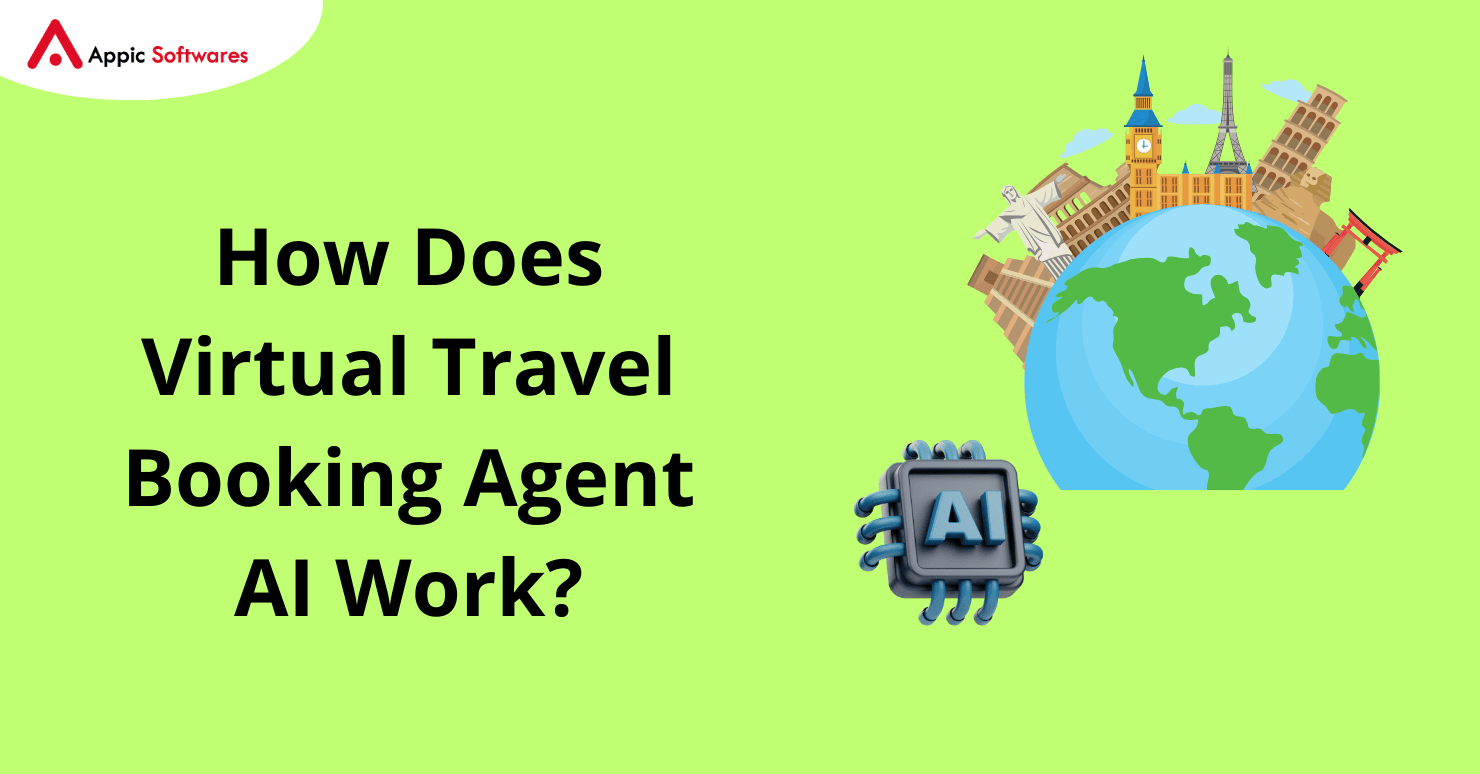
The traveling industry has not been ignored in the rapidly growing world of technology. The emergence of virtual travel booking agent AI has transformed how we plan and make bookings to organize our trips. These intelligence-based systems utilize artificial intelligence AI to provide customized travel recommendations on behalf of previous customer reviews, streamline booking procedures, and increase the overall user experience. But how exactly does a virtual travel booking agent AI perform its work? What are the expenses involved in designing one? And what features are necessary for its success? This article goes through these questions, providing an extensive guideline for understanding the complexities of AI in travel and tourism.
A virtual travel booking agent AI is a modernized system that utilizes artificial intelligence AI to help users plan and book their travel destinations. Unlike other traditional travel agents, these AI-powered systems can analyze and process vast volumes of data in a short time, providing customized suggestions based on user reviews, preferences, budgets, and past behavior. Consolidating AI in travel and tourism has made the booking process easy and increased the travel experience by offering needed suggestions and prompt support.
What is meant by Virtual Travel Booking Agent AI?

Virtual travel booking agent AI depicts an intelligence-based system specially designed to help and guide users while planning, booking, organizing, and managing their travel plans. These systems employ natural language processing (NLP), machine learning algorithms, and data analytics to understand user choices better and provide customized travel recommendations. Unlike other traditional travel agents, virtual travel booking agent AI can operate 24/7, providing prompt support and updates in real-time.
The main goal of a travel AI agent is to clarify and simplify the travel planning process, making it more efficient and user-friendly. By understanding and analyzing user data, these systems can recommend destinations, accommodations, and activities that align with the user’s interests and budget. In addition, when you work with a leading travel app development company like Appic Softwares, we plan to add important features such as visit planning, flight reservations, and hotel reservations, all while providing in-time updates, alerts, and announcements.
How Does Virtual Travel Booking Agent AI Work?
The functions of a virtual travel booking agent AI can be divided into several key components:
-
Collection of data
The first step in operating a virtual travel booking agent AI is data/information collection. The system accumulates data from several sources, including social media, user inputs, past travel history, and external database systems. This data is then processed using machine learning algorithms to highlight and identify patterns and choices.
For example, if a user frequently searches for shopping centers, the AI system will identify shopping-related suggestions in future searches. The more data the system collects, the more authentic, accurate, and customized its suggestions become.
-
Natural Language Processing (NLP)
Natural Language Processing (NLP) is a critical virtual travel booking agent AI ingredient. NLP allows the system to understand and interpret user inquiries in natural language. This makes it easy for users to interact with the AI agent conversationally, making the experience more convenient and user-friendly.
For example, a user can inquire, “What are the best shopping centers in New York for family shopping?” The AI system will access the data, analyze it, process this inquiry, understand the context, and offer a list of the most suitable shopping centers based on the user’s past preferences and budget.
-
Customized Recommendations
One of the prominent features of a virtual travel booking agent AI is its capability to provide customized suggestions. The system can recommend destinations, reservations, and activities that best fit the user’s experience and budget capacity by processing user data.
For example, if a user has a record of reserving luxury cars, the AI system will automatically suggest expensive bookings. Similarly, if a user likes sports vehicles, the system will suggest vehicles that suit his past choices.
-
Updates and Alerts in Real-Time
A virtual travel booking agent AI can offer prompt real-time alerts and updates, ensuring consumers are always updated about their travel plans. This includes flight schedules, gate alterations, weather updates, etc.
For example, if scheduled for a user’s flight is late or changed, the AI system will instantly update the user and recommend alternative options if required. This real-time update increases the overall travel experience, reducing uncertainty or stress.
-
Consolidation with External Systems
A virtual travel booking agent AI must consolidate with several external links, including airline databases, hotel reservation systems, and payment options for customer convenience to offer overarching travel possibilities. This consolidation allows the AI system to access and analyze real-time data and process bookings conveniently.
For example, when a customer reserves a flight using the AI system, it corresponds with the airline’s database systems to finalize the reservation and offer the ticket. Likewise, when reserving a hotel, the AI system communicates with the hotel’s booking management system to book the reservation.
How Much Does It Cost To Develop A Virtual Travel Booking Agent AI?
The cost of designing/developing a virtual travel booking agent AI can vary categorically depending on many factors, including the complications of the program, the key features involved, and the designing team’s experience. Here are some essential factors that have an impact on the AI agent development cost:
| Component | Description | Estimated Cost ($) |
| UI/UX Design | Creating a user-friendly interface for web and mobile. | $1,500 – $4,000 |
| Frontend Development | Building a responsive interface using React, Flutter, or Vue.js. | $3,000 – $8,000 |
| Backend Development | Setting up the core backend, database, and APIs. | $4,000 – $10,000 |
| AI Chatbot (Basic NLP Model) | A rule-based chatbot with basic natural language processing. | $3,000 – $7,000 |
| Machine Learning (ML) Model | AI for travel recommendations, pricing predictions, and personalization. | $5,000 – $12,000 |
| Third-Party API Integration | Integrating travel APIs (Amadeus, Skyscanner, Booking.com) and payment gateways (Stripe, PayPal). | $2,500 – $8,000 |
| Database Setup | Storing user data, search history, and transactions. | $2,000 – $5,000 |
| Cloud Hosting & Infrastructure | Deploying on AWS, Google Cloud, or Azure. | $2,000 – $6,000 (initial setup) + $300 – $1,000/month |
| Security & Compliance | Implementing security measures like encryption and user authentication. | $2,000 – $5,000 |
| Testing & Quality Assurance | Functional, performance, and security testing. | $1,500 – $4,000 |
| Deployment & Launch | Final app and web deployment. | $1,000 – $3,000 |
| Ongoing Maintenance | Updates, bug fixes, and server monitoring. | $1,500 – $5,000/year |
-
Complexity of the AI System
The AI system’s complications are a mandatory factor that can impact the cost of travel app development. A fundamental virtual travel booking agent AI with limited functions will cost less to design than an upgraded advanced program with so many functionalities.
For example, a fundamental AI system that offers basic travel suggestions may charge between $22,000 and $55,000. In contrast, a more efficient and advanced program with functions like alerts, real-time updates, customized recommendations, and consolidations with external systems can raise the cost by $100,000.
-
Expertise of the Development Team
The development team’s expertise also plays a vital role in identifying the cost of AI agent development. A team with vast experience in AI and travel application development will generally charge higher rates than a team with less experience.
Hiring an experienced team can result in a more vigorous and compatible AI system, decrease the risk of technical problems, and ensure a flawless end-user experience.
-
Functionalities and Key Features
The functionalities and key features of the virtual travel booking agent AI will also influence the overall cost. Modern features like natural language processing, updates in real-time, and customized suggestions require a longer development time frame and resource allocation, which increases the total cost.
For example, consolidation of NLP capabilities into the AI system can add 10,500 to 11,000 to 25,000 to the development expense. Likewise, adding up updates in real-time and alerts may need additional costs in data consolidation and processing abilities.
-
Updates and Maintenance
The expense of designing a virtual travel booking agent AI does not end with the initial design. Regular maintenance and updates are vital to ensure the program remains operational and upgraded with the latest advancements and user preferences.
Maintenance costs can vary depending on the program’s complications and the frequency of updates. On average, businesses can incur between 6,000to6,000to15,000 annually on maintenance and updates.
Must-Have Features In A Virtual Travel AI
Certain features must be included to ensure the success of a virtual travel booking agent AI. These features make the user experience better and differentiate it from the AI system and competitors. Here are some of the key features to take into consideration:
-
Customized Recommendations
As discussed earlier, customized recommendations are a foundation for any successful virtual travel booking agent AI. The AI system can provide precise recommendations that correlate with the user’s priorities and budget range by accessing user data.
-
Natural Language Processing (NLP)
Natural Language Processing (NLP) is mandatory to enable conversational correspondence between the user and the AI system. NLP allows users to correspond with the AI agent naturally and intuitively, magnifying the overall user experience.
-
Real-Time Updates and Alerts
Alerts and updates in Real-time are critical for keeping users well-informed about their travel plans. This involves flight status updates, gate modifications, weather updates, etc. Instant support decreases stress and uncertainty and glorifies the overall travel experience.
-
Incorporation with External Systems
A virtual travel booking agent AI must combine various external systems, such as airline databases, hotel booking management platforms, and payment options, to provide overarching travel possibilities. This amalgamation allows the AI system to analyze real-time data and seamlessly secure reservations.
-
User-Friendly Interface
A user-friendly interface is mandatory to ensure users can conveniently steer and correspond with the AI programs. Despite the user’s technical exposure, the interface should be instinctive, appealing, and convenient.
-
Multiple-Language Support
In the worldwide travel industry, multiple-language support is a mandatory feature. A virtual travel booking agent AI should be capable of interacting with users in multiple languages, providing a diverse audience, and increasing the overall user experience.
-
Privacy and Security
Given the sensitive nature of travel-related data, security and privacy are essential. The AI system must take vigorous security precautions to protect user data and ensure compliance with data protection rules and regulations.
-
Scalability
As the user foundation grows, the AI system must be able to scale up accordingly. Scalability ensures the system can manage enhanced traffic and data processing needs without sacrificing performance.
Conclusion
The consolidation of AI in travel and tourism has altered the way we plan and make reservations for our journeys. Virtual travel booking agent AI provides a wide range of advantages, from customized suggestions to updates in real-time, making the travel planning process more effective, efficient, and enjoyable. Designing a successful travel AI agent requires careful consideration of several factors, including the program’s complications and complexity, the functions included, and the development team’s experience.
By analyzing how virtual travel booking agent AI performs and the expenses included in its development and design, businesses can make well-informed decisions on time and craft AI systems that match the needs of their users. With the right features and functionalities, a virtual travel booking agent AI can transform the whole travel industry, providing seamless and customized travel experiences for users globally.
FAQs
1. How does AI in virtual travel booking agents customize travel suggestions?
Virtual travel booking AI uses machine learning to synchronize with user preferences, past reservation choices, and browsing behaviors. By analyzing this data, it recommends modified options like destinations, reservations, food points, and activities. For example, if a user frequently reserves five-star hotels, the AI recommends lavish accommodation options, ensuring a highly customized experience.
2. What role does natural language processing (NLP) play in virtual travel booking AI?
NLP enables AI to analyze and correspond to user inquiries in natural language, making correspondence conversational. Whether you ask, “Find me a sea view resort under $300,” or “What’s the best time to visit Malta?” the AI analyzes the request, searches databases, and provides authentic, conversational feedback.
3. Can virtual travel booking AI handle real-time updates and changes?
Yes, AI consolidates with global distribution systems (GDS) to access instantly updated data on flights, hotels, and weather. If a flight is canceled/delayed or a hotel is overcrowded, the AI immediately recommends alternative options to ensure a smooth travel experience without manual and hassle-free procedures.








